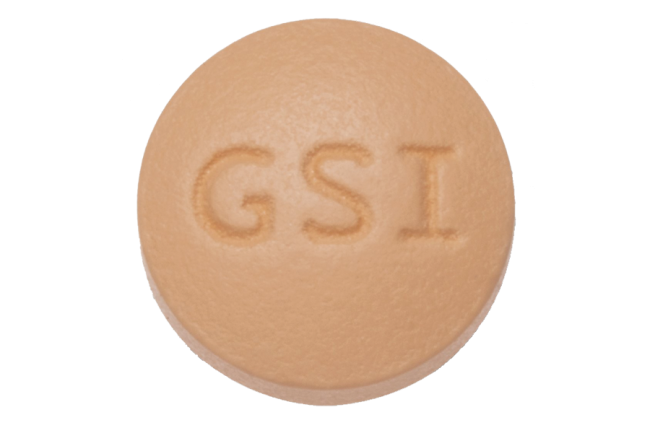Vemlidy
Take your missed dose as soon as possible unless it is less than 12 hours until your next dose. Never double your dose.
No dose adjustment required for those with a creatinine clearance (CrCl) of at least 15 mL/min (measurement of kidney function), as well as those below 15 mL/min who are receiving chronic hemodialysis (HD). For people on chronic hemodialysis, take tablet once daily and administer after completion of hemodialysis on days of HD treatment.
25 mg tablets: $1,730 / month
Be sure to tell your medical provider or pharmacist about all the medications, supplements, and herbs you take, whether they are prescribed, over-the-counter, or recreational, before starting this regimen. Report any changes in your medications as they happen. Because Vemlidy (TAF) is related to Viread (tenofovir disoproxil fumarate, TDF), the two medications cannot be taken together. Similarly, Vemlidy cannot be taken with any of the following HIV combination medications, as they contain tenofovir (TDF or TAF): Atripla, Biktarvy, Cimduo, Complera, Delstrigo, Descovy, Genvoya, Odefsey, Stribild, Symfi, Symfi Lo, Symtuza, Temixys or Truvada. If taken with the anticonvulsant carbamazepine, Vemlidy dosage should be increased to two tablets once per day. Vemlidy should not be taken with other anticonvulsants, such as oxcarbazepine, phenobarbital or phenytoin. Vemlidy should also not be taken with the antimycobacterial medications, such as rifabutin, rifampin and rifapentine, or St. John’s wort.
Vemlidy is a very well-tolerated medication with minimal side effects. The most commonly reported side effects are headache, abdominal pain, fatigue, weakness, nausea and back pain. Other, more rarely reported, side effects include rash, excessive gas, and generalized pain and achiness. Vemlidy may lead to decreases in bone mineral density (BMD); patients should be monitored for osteoporosis or osteopenia. Vemlidy is processed by the kidneys, so there is some risk of decreased kidney function. Before starting treatment, patients should have their creatinine clearance (CrCl) assessed. Routine monitoring of glucose and protein in the urine and of serum phosphorus should be standard of care, too. If you experience any pain in the extremities, persistent or worsening bone achiness/pain or fractures with or without muscular pain, consult your medical provider immediately. Although rare, Vemlidy may lead to lactic acidosis, a buildup of lactic acid in the blood, which could be fatal. Signs and symptoms of lactic acidosis include feeling very weak or excessively fatigued, difficulty breathing, stomach pain with nausea and vomiting, feeling cold and chills (especially in arms and legs), dizziness and light-headedness, fast or irregular heartbeat or unusual muscle pain. If you experience any of these symptoms contact your medical provider immediately. Two liver conditions—hepatomegaly (enlarged liver) or steatosis (fatty liver)—may occur. Signs and symptoms of these liver conditions include yellowing of the eyes and/or skin (jaundice), dark colored urine, light colored stools, nausea, loss of appetite and pain, achiness or tenderness of the liver (lower right side of the belly, below the ribcage and next to the belly button).
Vemlidy will not cure HBV—currently, no HBV medication will cure you—but it can decrease your risk of long-term complications such as cirrhosis or liver cancer. Vemlidy is related to Viread. Vemildy and Viread are also HIV medications.
Before starting Vemlidy, you should be tested for HIV. If you are coinfected with HBV/HIV, you should not treat HBV without also treating your HIV to prevent the development of HIV resistance mutations. In people with HBV/HIV coinfection, the combination of Emtriva and Vemlidy (or Viread) is the preferred regimen for treatment of HBV. If you have HBV/HIV and need to switch from any tenofovir-containing regimen—such as Vemlidy—there is a risk of an HBV flare-up with signs and symptoms of acute HBV infection. Abrupt discontinuation of Vemlidy may cause a severe, acute exacerbation of hepatitis B, which can result in hepatic decompensation and liver failure. If Vemlidy is discontinued, your doctor should closely monitor you for symptoms of exacerbation. Do not stop this medication without talking to your doctor first. SEE HBV Reactivation for more information and consult your medical provider. For individuals with HBV/HCV coinfection, or who are at risk of HBV reactivation while undergoing HCV DAA treatment, Vemlidy is one of the medications that can be prescribed to prevent this from happening and is safe to use while being treated for HCV.
Vemlidy is safe for people with mild liver damage (Child-Pugh A), but it should not be used in patients with decompensated cirrhosis (Child-Pugh B or C).


